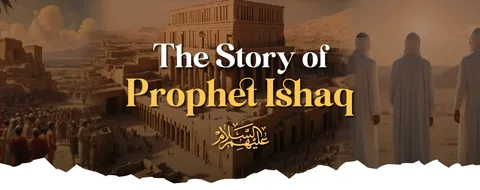Prophet Saleh (صالح) is one of the prominent figures in the Islamic tradition. His story is mentioned in several places in the Qur’an, where he is recognized as a prophet and messenger sent to the people of Thamud. Thamud was an ancient civilization that lived in the northwestern Arabian Peninsula, known for its advanced skills in architecture and stone carving. However, despite their sophisticated society, they fell into corruption, idolatry, and disobedience to Allah, which led to their eventual destruction, in this article on Arabian Tongue website we will explorer The Story of Prophet Saleh.
The People of Thamud

The Thamud people were descendants of ‘Ad, another ancient people who had been destroyed due to their rebellion against God. The Thamud lived in a region known for its abundant water and fertile lands, and they built homes in the mountains, carving them from the solid rock of cliffs. Their civilization was prosperous, and they enjoyed many blessings from Allah, including fertile land and abundant resources.
However, despite the countless blessings, the people of Thamud were proud, arrogant, and ungrateful. They began to worship idols and turned away from the worship of Allah. Their society was marked by corruption, injustice, and the exploitation of the weak. The people indulged in various immoral behaviors and rejected the message of righteousness and monotheism.
Read more: The Story of Prophet Idris
The Arrival of Prophet Saleh
In response to the moral decay of the Thamud people, Allah sent Prophet Saleh to guide them back to the straight path. Saleh was a man of great integrity and wisdom. He was a direct descendant of Prophet Hud (who had been sent to the people of ‘Ad) and was known for his righteousness, honesty, and piety.
Saleh was chosen to be a prophet because of his strong character and his ability to lead by example. He was a man of reason and wisdom, and Allah gave him the ability to communicate the message of truth to his people. When Saleh approached the Thamud people, he invited them to worship only Allah and abandon their idols. He called them to righteousness and asked them to abandon their corrupt ways.
The Signs Given to Prophet Saleh
Saleh’s message was met with resistance from the powerful elite of the Thamud society. They were unwilling to let go of their idolatry and materialistic desires. The leaders of the people mocked Saleh and demanded that he show them a miracle to prove his divine appointment as a prophet.
In response to their request, Prophet Saleh prayed to Allah, and Allah granted him a miraculous sign. He was given a she-camel, a majestic creature that emerged from the mountainside. This she-camel was unlike any ordinary camel; it was a sign of Allah’s power and a direct message to the people of Thamud. The camel was to be a sign of Allah’s mercy and grace, and the people were instructed not to harm it.
The camel had a specific role in the life of the Thamud people. It was to drink water from the well on certain days, while the people would drink on other days. This arrangement was a clear test for the people, as they were instructed to show respect for the camel and not harm it. The people of Thamud were also told that the camel was a sign of Allah’s mercy, and harming it would result in dire consequences.
Read about: The Story of Prophet Nuh
The Rejection and Disobedience
Despite the clear sign from Allah, the Thamud people continued to reject Prophet Saleh’s message. The elite of the society, who had the most to lose from the abandonment of idol worship and material wealth, led the charge against Saleh. They saw the camel as a threat to their way of life and viewed it as a symbol of their own inferiority.
In a moment of defiance, a group of people from the Thamud, led by a rebellious individual, decided to kill the she-camel. They thought that by killing the camel, they would be able to discredit Saleh and eliminate the sign of Allah. This act of cruelty and rebellion was a direct challenge to the authority of Allah.
Despite this challenge, Prophet Saleh remained patient and continued to call the people to repentance. He warned them that if they did not repent for their actions and turn back to Allah, they would face severe punishment. He told them that they had a short time to reconsider their actions before the punishment would befall them.
The Destruction of the Thamud People
As Prophet Saleh had warned, the people of Thamud faced the consequences of their actions. After they killed the she-camel, they had sealed their fate. Allah’s punishment was swift and decisive. The punishment took the form of a mighty earthquake, which struck the people of Thamud, causing their homes and buildings to collapse. Along with the earthquake, a devastating sound or blast, often described as a terrible shriek, also struck the people. The earth quaked, and the people were destroyed in an instant.
The Qur’an describes the fate of the Thamud people in several verses. Allah says in Surah Al-A’raf (7:77): “So they killed the she-camel and were insolent toward the command of their Lord. And they said, ‘O Saleh, bring us what you promise us, if you should be among the messengers.'”
Saleh and the few believers who followed him were saved from the punishment, as they had remained faithful to Allah. They left the Thamud region and moved away, while the rest of the people were wiped out by the divine wrath.
Lessons from the Story of Prophet Saleh

The story of Prophet Saleh offers many important lessons:
-
The Importance of Gratitude: The Thamud people were blessed with wealth, fertile lands, and prosperity. However, they failed to appreciate the blessings of Allah and instead became arrogant and ungrateful. This teaches us the importance of being thankful for the blessings we receive and not taking them for granted.
-
The Dangers of Arrogance and Pride: The people of Thamud rejected the message of Prophet Saleh due to their pride and arrogance. This serves as a reminder that pride can prevent people from accepting the truth and can lead to their downfall.
-
The Power of Allah’s Signs: The miraculous she-camel was a clear sign from Allah, yet the people of Thamud ignored it. This shows that despite the many signs that Allah sends, some people will still choose to reject them.
-
The Consequences of Disobedience: The punishment that befell the Thamud people was a direct result of their disobedience to Allah and their rejection of His messenger. This teaches us the importance of obeying Allah and following His guidance.
FAQs
Who was Prophet Saleh?
Prophet Saleh was a messenger sent by Allah to the people of Thamud. He was known for his wisdom, integrity, and patience in calling his people to worship Allah alone and abandon their idol worship.
What was the sign given to Prophet Saleh?
The sign given to Prophet Saleh was a she-camel that came out of the mountain. This camel was a clear sign of Allah's mercy and was to be protected by the people of Thamud.
What happened to the people of Thamud?
The people of Thamud were destroyed by a mighty earthquake and a devastating blast as a punishment for killing the she-camel and rejecting the message of Prophet Saleh.
What lessons can we learn from the story of Prophet Saleh?
The key lessons from the story of Prophet Saleh include the importance of gratitude, humility, obedience to Allah, and the dangers of arrogance and pride.
Why did the people of Thamud reject Prophet Saleh's message?
The people of Thamud rejected Prophet Saleh's message because of their arrogance, materialism, and their unwillingness to give up idol worship and sinful behaviors.
Conclusion
The story of Prophet Saleh and the people of Thamud is a powerful reminder of the consequences of pride, ingratitude, and disobedience to Allah. Despite receiving a clear sign of Allah’s power, the people of Thamud chose to reject the truth and suffered the consequences. This story calls on us to reflect on our own behavior and to recognize the importance of gratitude, humility, and faithfulness to Allah.

